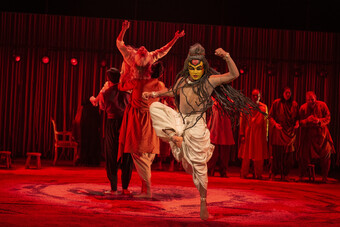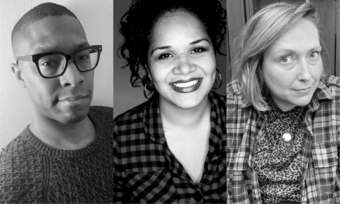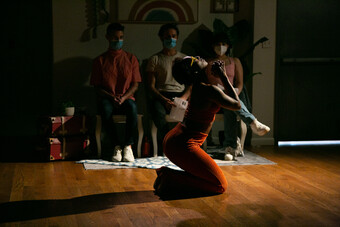Little Boxes
A playwright’s notes on quantified identities
Two weeks ago I did a Google search on down coats. The sunny day after my virtual search, I found a cute red down coat on sale in a downtown shop and bought it. Great, good for you, you’d say, so what? Well, it turns out it’s not so good; it’s actually quite annoying. Since then my Facebook and Yahoo pages, all my Internet searches, are invaded by ads for down jackets popping up in all sort of styles and colors. Of course Google registered my interest in those lovely winter coats and does its best to make my wish come true, to give me plenty of choices daily, at any given moment. How can I let Google and the Gods of Internet know that:
(shouting) I bought a freakin’ down coat! I don’t need another one! And it’s spring!
Last month I was doing Internet research for a character suffering from a particular disease. Google proved helpful indeed and I got lots of useful information. On the down side, my Facebook and Yahoo pages are now regularly glittered by flashy ads of various treatments for that particular disease.
(shouting) I’m not sick, give me a break, Google!
I like to believe that the role of an artist-citizen, of a playwright, is to zoom in on the little boxes of assigned identities and show to the world how unique, beautiful and unquantifiable any human being is.
I have been a part-time faculty member at New York University for the last seven years. Two months ago, The Chronicle of Higher Education sent me a survey to “improve my experience,” and I guess I put a forgettable X in a small white box labeled part-time. Since then, the journal sends me only articles for adjuncts. Gone are the days when I could keep myself informed about a large variety of issues in academia. My “improved” specific experience sucks.
We, as individuals, as humans with a shared foundation of biological and psychological behavior, need to be challenged by other people’s opinions in order to grow. If we are prisoners of a little box of identity, we are doomed to stagnation and self-sufficiency. The human race progresses through big and small revolutions, through shaking the tree of knowledge, through subverting the system, through challenging the established patterns.
Our identity is fluidly constructed by the stories we are told and the stories we tell, not the boxes we check.
Each time we mark a box or answer a question online, our identity is promptly quantified in this brave new world of pixels, tracks, and labels. We are encouraged to fine-tune our goals and work resolutely towards achieving them, to see our dramatic journey as linear as possible, to focus on a target, to be efficient, to brand ourselves, otherwise we’ll just disappear in the vacuum of nonsellable entities.
Variations on life’s dramatic structure
Aristotle seems to have it his way not only in dramatic writing but in nondramatic living too. Our journeys are supposed to have a beginning, a middle, an end, a climax and a resolution. The perfect phallic dramatic structure. What about a “female” structure with multiple climaxes? No, that’s hard to monitor, hard to control. Not to forget that some of those can be fake happy endings.
Recently, at an otherwise very inspiring meeting of women artists, the discussion climaxed multiple times around the issues of how to present yourself to artistic directors, how to express confidence and walk&talk like a man, how to get the decision makers interested in you as a person, how to pitch a play in five cocktail minutes, how to impress without relying on your dress. I kept waiting for us to talk about what’s inside our brains: What kind of plays do we write? What is a good play? Who decides what a good play is? Can male artistic directors truly appreciate a woman’s comedy, for instance, or are the labels “light” and “sappy” automatically assigned? Can the powerful straight male movers&shakers get a very dark visceral play by a woman or gay writer? Can white people fully understand the issues explored by people of color? Is the Western white upper-middle class paradigm truly fading away leaving room for multiple perspectives and diverse models? And how/when are we going to discuss the substance of our work when all our public discussions are about money, marketing, and (self)promotion?
Is it really not about what we write, but who we are, and who we know, what kind of issues we tackle, which little box can the mainstream theatre mark in their season’s programming?
One could empirically detect a few play(ful) archetypes: The White Dysfunctional Upper Middle Class Family Play (prevalent), The Yuppie Relationship Drama (everywhere), The Black Play (mandatory), The Gay Play (rare), The Asian-American Play (rare), The Latino Play (rare), The British Play (often), The Experimental Ensemble (only in cool theatres), The International Play (produced by small theatre companies, it usually comes in a super combo pack including travel exchange and funding from foreign cultural centers).
Lately we can also see The Arab Play here and there, in progressive theatres, as well as The New Hot Playwright Play (for minimal attunement to the Zeitgeist). Second chances for a play/playwright are rare, artistic directors are still aroused by the romantic “virginity” myth—to discover a fresh text/talent and penetrate the market with that new name.
Branding myself
Our lives today are shaped by corporate patterns and efficiency strategies. The artist is only a product. Yes, but we are products and producers at the same time.
A distinguished professor of theatre told me: You gotta brand yourself better! Focus on your niche: Eastern Europe.
Just that, Eastern Europe? But I’m interested in so many other cultures and inter-cultures. I founded an alliance called Immigrant Artists and Scholars in New York (IASNY) and we’ve produced some cool and meaningful events where people of many races and ethnic backgrounds felt at home.
Am I doomed to always be the Romanian, the Eastern European, to write only about Eastern Europeans and maybe the Balkans, to organize exchanges with Eastern Europe, to go on vacations in Romania (I’ve never been in the Caribbean!), do I have to go back again and again to the culture of my past? In this global, multi-cultural world, is the past so imprinted in our DNA that there is no way to escape it, to enrich it, to move towards—okay, even in a linear Aristotelian way—a more inclusive future?
I was a student when I met Caryl Churchill when she was researching Mad Forest in Bucharest, Romania. A brilliant play, I loved it, but I kept telling myself that the story of the Romanian revolution needed to be heard from inside the Romanian culture as well. I was there in the streets, I must become a playwright and circulate my own version of the story. (Yes, I moved to London first.)
My journey as a foreign-born playwright who came to the U.S. only a decade ago (a week before 9/11… imagine the cultural shock!) has been one of enthusiastic and genuine struggle to fully conquer the English language. To write my stories in English in order to reach a wider audience.
Now my own stories inhabit the same theatrical space as Churchill’s, both our perspectives and styles are (t)here, within the reach of producers, artistic directors, students. Yes, she’s going to be the chosen one most of the time, like an older sister who does everything better than the younger one, but hey, at least we are dramatic “sisters” now.
The lesson that Caryl Churchill unintentionally taught me is that writers have the responsibility to respond to their own immediate history. To capture the present and pass it to the future through their (fictionalized) stories.
Story-constructed identities
Sociologist Ken Plummer’s interpretation of intimate tales and his reflection on people as “socially constructed biographical objects” created through producing/receiving public stories, made me think of story-constructed identities versus box-constructed identities.
A few years ago, when I was in the Performance Studies Department at NYU, I thought of a cool conceptual performance: each day of a week I would pretend to have a different ethnic background and see how random people’s reactions to me changed. For instance on Monday I would be Latina, on Tuesday—Israeli, on Wednesday—Palestinian, on Thursday—Turkish, on Friday—Greek, on Saturday—Macedonian, and on Sunday—Romanian. I never got to really do it, but I’m still thinking of this concept and what it could reveal.
People are not walking boxes of data (or maybe they are - the IT specialists would argue) but complex individuals with distinct e-motions and subjective hi/stories. Failing to see the individual and automatically assigning group/boxes identities is often the source of racism and intolerance. I like to believe that the role of an artist-citizen, of a playwright, is to zoom in on the little boxes of assigned identities and show to the world how unique, beautiful and unquantifiable any human being is.












Comments
The article is just the start of the conversation—we want to know what you think about this subject, too! HowlRound is a space for knowledge-sharing, and we welcome spirited, thoughtful, and on-topic dialogue. Find our full comments policy here
Very insightful article. Congrats!
In solidarity,
Vera
Great article, straight to the point! I am Eastern European myself, actress, and I get to play only Eastern European characters here in NY. The mentality of people has to change! The powerful straight male should appreciate a visceral play by a woman or gay writer. Male artistic directors should appreciate the power of a talented actress who doesn't use her look to get ahead, but her talent! Thanks for bringing this up Saviana!
Thanks, Saviana! I totallly agree with the points you make. The idea of story-constructed versus box-constructed identity is powerful. As a gay Asian-American (as you know) I have experienced the feeling of being considered a "walking box of stereotypes" many times.
Well said, Saviana!
Very true. My husband and I joke that we would never, ever have met online because our backgrounds, races, and interests are so different. Yes, there's an intersection, but it's small. Only out in the world can you meet someone different from yourself. As we dive into social media, do we have more and more "friends" who are essentially clones?
Excellent article! I am a Turkish-born visual artist and I'm never sure which box to check on application forms:
White/Caucasian? - I'm not really that, but then what am I?
Muslim? I'm not Muslim, my father is Muslim, my mom is Greek Christian, I'm rather nonreligious, a wild unquantifiable bird...
Indeed, see what profiling and "assigned identity" did in the case of Trayvon Martin:
http://www.miamiherald.com/...
I love the ending of this blog post, I will pass it around to friends:
"Failing to see the individual and automatically assigning group/boxes identities is often the source of racism and intolerance. I like to believe that the role of an artist-citizen, of a playwright, is to zoom in on the little boxes of assigned identities and show to the world how unique, beautiful and unquantifiable any human being is."
Thank you, Saviana, for this essay! As a Bulgarian-born artist, I fully resonate with the ideas expressed in it, I consider myself a global citizen, I don't like to fit in a little white box, I am much more than that.